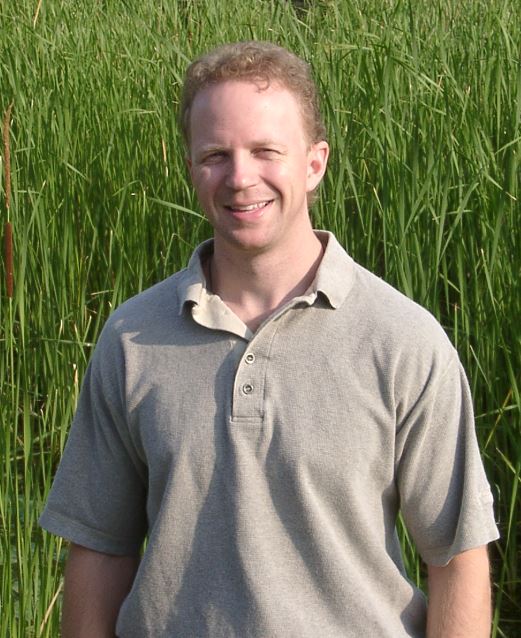
You may find Rodney Verhoeff sitting in his office, a zebra-mussel-encrusted shoe on his windowsill, a vase of Garlic Mustard and Dame’s Rocket sprigs decorating his desk, large plastic bighead carp stacked on top of his bookcase. The space appears personalized, as though each of these items is a quirky fascination for Verhoeff. And, in a way, they are. Except that rather than study these items to preserve them, Verhoeff seeks to keep them far away from Nebraska.
The new Invasive Species Program Specialist at SNR, Verhoeff’s job is to advance awareness about invasive species to prevent their advancement.
“It’s much easier to do preventative work than restoration,” said Verhoeff. “Early detection and rapid response are vital. We do identification workshops to help people be well-educated. They become our early eyes.”
Verhoeff is well-suited to help educate the public. A people-person, Verhoeff is passionate about communication.
“Communication really is the key to anything you do,” said Verhoeff. “If you can’t communicate your ideas or research, you can’t succeed.”
Verhoeff’s passion for communication emerged over the course of his roundabout career. Initially an industrial engineering major at UNL, Verhoeff never really expected to become an invasive species specialist.
“I had an internship in industrial engineering the fall of my senior year of college,” recalled Verhoeff. “It was not for me at all—no interaction with people. I knew I had to do something else.”
So in the spring of his senior year, Verhoeff sat down with an advisor to discuss his options. Verhoeff enjoyed working with natural resources and learned that many of his previous courses in engineering prepared him to study water resources. UNL had just established a water science major, so Verhoeff pursued the study. Then, when a professor approached Verhoeff about conducting research in soil physics and soil-and-water resources, Rodney decided to continue his education with a master’s degree in Agronomy.
“The master’s degree was a fantastic opportunity to hone my communication skills,” said Verhoeff. “It helped complement the technical skills and knowledge I had previously developed.”
After graduating, Verhoeff took a job working as a water resources manager with the Upper Elkhorn NRD. As part of his job, he had to create a water resource management plan, a task that required Verhoeff talk to a lot of people in the region.
“I had always thought of myself as a shy person,” Verhoeff admitted. “But I found people really fascinating. I was really surprised to discover that I liked being with people.”
Having made this discovery, Verhoeff became a consulting water scientist. His task: analyzing water systems, telling his clients about his findings, and answering questions. This experience made Verhoeff more interested in the various concerns of diverse groups, an interest that blossomed into a position as the Executive Director of the Niobrara Council.
“I brought together federal and state agencies and land owners to discuss their concerns about the river. The experience of bringing people to the table helped show how valuable collaboration is.”
Later, Verhoeff took the helm of the Lower Platte River Corridor Alliance, a program that served as a facilitator for finding solutions to regional watershed issues in eastern Nebraska. “Sitting down and getting diverse interests to engage face-to-face helped people discover that it is possible to find common ground even with contentious issues.” It was also in this position that Verhoeff truly began to focus on the impacts of invasive species.
Now acting as the Invasive Species Program Specialist, Verhoeff uses his communication skills to help the community face the threats imposed by invasive species. “It’s totally different from what I thought I’d be doing when I graduated with a major in water science,” admitted Verhoeff, “But I love to help get people excited about natural resources.”
Verhoeff believes there still is a general disconnect between researchers and the people who will use the research on the ground. What he loves about being a part of SNR is that the Nebraska Cooperative Fish and Wildlife Research Unit he works for tries to close the gap. “Here, we develop best practices steeped in good research,” Verhoeff explained.
And if there’s anything that bridges the distance between researchers and the public, it’s communication. “If you look at why we’re doing research, it’s because we want to know why something happens and how it impacts us,” said Verhoeff. “We then have to communicate those answers to others.” Verhoeff hopes that every student at SNR will take the time to really enhance their communication skills.
We welcome—back—Rodney Verhoeff. And we look forward to all the various ways he will continue to help us build more bridges with our community.